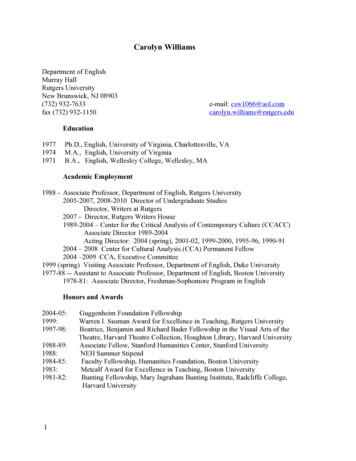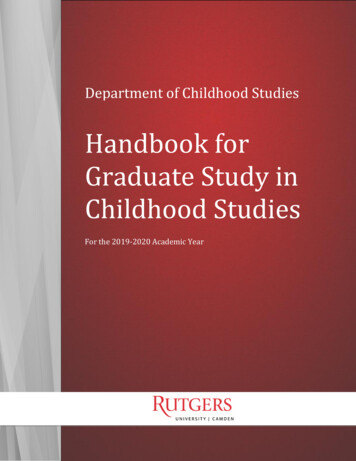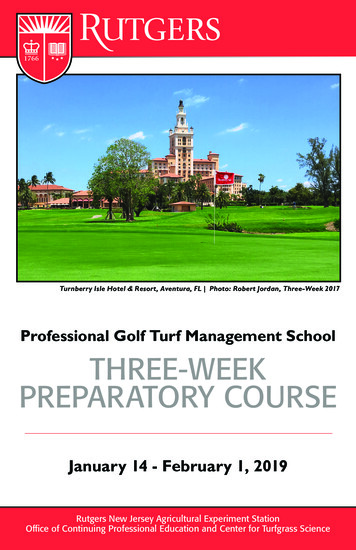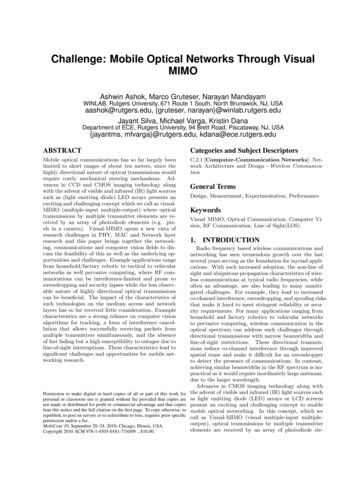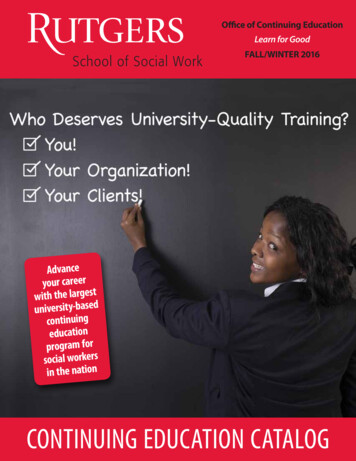
Transcription
Office of Continuing EducationLearn for GoodFALL/WINTER 2016Advanceyour careerwith the largestuniversity-basedcontinuingeducationprogram forsocial workersin the nationCONTINUING EDUCATION CATALOG
Let RUTGERS come to YOUCUSTOMIZED WORKSHOPS can bringhigh-quality, University-sponsored trainings andentire certificate programs to your agencyWhat you provide:What we provide: Participants Expert instructors coming to you Classroom Handouts for each participant Equipment (if needed) Certificates of Completion sent to you CEUs approved for Social Workers,Teachers, and Licensed Professional CounselorsGreater organizational impactTraining tailored to your unique needsCost effective - no travel time, group rateStaff learn the same information at the same timecall 848-932-8758 for informationTake the Next Step —Choose Your MSW at Rutgers University Degree options include anIntensive Weekend MSW forworking professionals, a 100%online MSW program, and full-timeand part-time study options at allthree Rutgers campuses. Students with an earned bachelor’sin any discipline may be considered.Those with a BSW may qualify foradvanced standing. Financial aid, fellowships, and 400,000 in scholarships areawarded annually. Meaningful field placementopportunities throughoutNJ, NY, PA, and beyond.To learn more, register for an upcomingevent by visiting socialwork.rutgers.eduor contact us at 848-932-7520, ext. 2
Table of ContentsDiscount Plan — “2 for 200”Ourworkshopsconsistentlyreceive top satisfaction scores.Many of youindicate youwould like toattend even moreworkshops,however costbecomes an issue.We have heardyour concerns andhave developedthe best discountplan in our almost40-year history.Our single-dayworkshop rate is 129, however, ifyou register fortwo workshops,the rate drops toOur main location at 200. For those of390 George Street inyou interested inNew Brunswick. Free Parking!attending severalworkshops or a certificate program, the rate is stackable —4 workshops for 400, 6 for 600, and so on. The discount ratedoes not apply to multi-day workshops or special programs.Get a jump on your CEHs this time. We hope to see you this fall!Are You Ready to Teach With Us?As you will see in this catalog, the Office of ContinuingEducation offers LOTS of topics relevant to social work practice.We are always interested in finding new instructors who haveexpertise and a driving passion to teach others. If you orsomeone you know is an experienced professional who wouldlike to partner with us in sharing your area of expertise, pleasecontact us at ce@ssw.rutgers.edu or go to our webpagehttp://socialwork.rutgers.edu/ce.The Office of Continuing EducationLearn for GoodContinuing Education WorkshopsIntroduction . 1Special Notices . 2The Must-Haves in CEHs (What’s Required) . 4Certificate Program Descriptions . 7Fall/Winter 2016 Workshops . 10Clinical Workshops . 10General Workshops (Nonclinical) . 15Workshops Listed by Topic AreaAddictions . 19Adoption . 20Case Management . 21Child/Adolescent Mental Health . 21Clinical Supervision . 23Mini-Certificate in Complex Trauma . 23Developmental Disabilities . 24Bowen Family Systems . 25Gerontology Programs . 27Basic Program in Gerontology . 27Advanced Program in Gerontology . 28Senior Housing Issues . 28Senior Services Management . 29Nonprofit and Public Management . 29Social and Economic Justice . 30Trauma Response and Crisis Intervention . 30Violence Against Women . 32Workshop Locations . 34Workshops by Location and Date . 35Registration and Cancellation Information . 40social work.rutgers.edu/ceRegistration Form . 41FALL/WINTER 2016 CONTINUING EDUCATION CATALOG 1
DISCOUNTS AVAILABLE!2 for 200SpecialNoticesOffice of Continuing EducationSchool of Social WorkRutgers, The State University of New Jersey390 George Street, 6th FloorNew Brunswick, NJ 08901Phone 848-932-8758Fax 732-932-7057Email: ce@ssw.rutgers.eduWebsite: socialwork.rutgers.edu/ceAll workshops are approved for ContinuingEducation Hours (CEHs) by the RutgersSchool of Social Work in accordance withNew Jersey Administrative Code 13:44Gand recognized by the:New Jersey Board of Social WorkExaminersPennsylvania State Board of SocialWorkers, Marriage and Family Therapists,and Professional CounselorsNew Jersey Department of Education,approval code 1965National Board for Certified Counselors,provider 6389The Rutgers School of Social Work is anNBCC-Approved Continuing EducationProvider (ACEPTM) and may offerNBCC-approved clock hours for events(or programs) that meet NBCC requirements. Sessions (or programs) for whichNBCC-approved clock hours will beawarded are identified in the programbulletin (or in the catalog or website).The Rutgers School of Social Work as theACEP is solely responsible for all aspectsof the program. (NBCC provider number6389).2 RUTGERS SCHOOL OF SOCIAL WORKAddictions workshops are appropriatefor LCADC and CADC recertification/renewal (N.J.A.C. 13:34 c-53).Association for Play Therapy (APT)Approved Provider 11-300State of New York — The RutgersUniversity School of Social Work Officeof Continuing Education is recognizedby the New York State EducationDepartment’s State Board for SocialWork as an approved provider ofcontinuing education for licensedsocial workers, provider 0069.All workshops in this catalog provideapproved continuing education hours forNew York social workers and New Jerseylicensed social workers, professionalcounselors, marriage and familytherapists, and teachers, unless noted.Our Main Location —390 George StreetWe are in a prime location close to freeparking, the train station, and manydiverse eateries within walkingdistance.FREE PARKINGWorkshop participants attendingtrainings at 390 George Street or theBoggs Center can park at the lowerChurch Street Parking Deck (90 ChurchStreet) for free! You will receive a freegate card to cover the parking cost. Besure to enter Church Street from NeilsonStreet.Our best discount ever makes it eveneasier to take all the workshops you needto complete your CE requirements. Planahead and register for the workshops thatbenefit you the most or consider startinga certificate program. Enroll early toensure your spot is reserved. Discount applies to individualregistrations in multiples of two (i.e. 2,4, 6 workshops, etc.) Registration for the workshops must bedone at the same time. Only workshops listed in the fall/winter2016 catalog are eligible. Discount can be applied to groupregistrations if submitted together.Normal cancellation policy applies;refunds will be prorated. Discount does not apply to multi-dayworkshops or special programs. Discount cannot be combined withother discounts or coupons.10% DiscountRutgers alumni, staff, field instructors,and students receive a 10% discount!Discounts cannot be combined with otherdiscount offers.Mini-Certificatein Complex TraumaA Four-Week Series with MonicaIndart, PsyD. Develop advanced skillsand knowledge in healing complextrauma through intensive training. Inthis popular program, you will learn aresilience-based, attachment-focusedtreatment framework to work withadolescents, adults, and older adults.Limited to 20 participants — sign upnow! See page 23 for more information.Are You Licensed inNew York? Read This As of January 1, 2015, social workerslicensed in New York State are required toobtain CEHs to maintain their license.The Rutgers University School of SocialWork Office of Continuing Educationis an approved provider of continuingeducation for LMSWs and LCSWs inNew York State (provider #0069). Unlessotherwise noted, all events in this catalogare approved for CE hours in New YorkState.
NY Locations andInstructors NeededIf your organization has comfortableclassroom space in NYC, we are interestedin renting or offering free workshopregistrations for your staff in exchange foruse of the classroom. Also, if you are aninstructor in or close to NYC, we wouldlove to speak with you as well — 848932-8438 or ce@ssw.rutgers.edu.Get CE Hours for theEntire OrganizationThrough CustomizedWorkshopsWe will develop training for any sizeorganization on virtually any topic andthen bring it to you. Train all your staffon the same topic at the same time. Tofind out more, contact us at ce@ssw.rutgers.edu or call 848-932-8758.Follow Us on Twitter!We are at @RutgersCEU. Receive specialupdates, promotions, and deals!SAVE THE DATES:October 28, 2016GSAPP 12th Annual Culture Conference:Friday, October 28, 2016, from 8:30 a.m.to 4:00 p.m. Busch Student Center,Rutgers University. Featuring keynotespeaker Kenneth Hardy, PhD. For detailsand online registration, visit: gsappweb.rutgers.edu/conference.April 1, 2017The Concerned Persons for Adoption“Let’s Talk Adoption” Conference ismoving from the fall to the spring. Samelocation, same CEHs. See www.cpfanj.org or email paben48@gmail.com forcurrent updates.Track Your CE Progresson Our WebsiteWe have designed our own registrationand account management system. Onlineyou can see a list of all our offerings,register for workshops, see your workshophistory, get directions to all workshopsites, and even see your progress in eachcertificate program with “CertificateAdvisor”! Just open your web browser andvisit socialwork.rutgers.edu/ce.Single Workshop orCertificate Program?You DecideAll workshops in the catalog can be takenindividually. Completing a certificateprogram is self-paced. Just sign up forany workshop you want. If it is part of acertificate program, we will automaticallyapply your attendance toward theappropriate certificate. You can trackyour progress on our website.Need Ethics and CulturalCompetence Workshops?We have several scheduled this fall andwinter. See page 4 for the “Must Haves inCEHs.”Rutgers LCSW/LSW ExamPrep CourseBe prepared to pass! Developed by theOffice of Continuing Education, thisengaging and stimulating workshop willcover what you need to know, teach youproven test-taking strategies, and provideuseful practice questions. See page 15.Want to Become anLCSW? If Yes, READ THIS!If you are an LSW who wants to becomean LCSW, do you know that your clinicalsupervisor must complete 20 hours of anapproved course in clinical supervisionbefore the start of your supervision?Since July 2004, LCSWs who do clinicalsupervision must first have a minimum ofthree years of licensure and at least 20 CEhours of a New Jersey Board of SocialWork Examiners approved course insupervision. We offer a fully approveddynamic 20-hour clinical supervisionseries to meet this need. See page 23for more NGCONTINUINGEDUCATIONEDUCATIONCATALOGCATALOG 3
Ethical Issues in the SchoolsOctober 1, 2016 Bordentown See page 10If It Isn’t in Writing, It Didn’t Happen:Documentation to Protect Your Client,Yourself, and Your OrganizationOctober 3, 2016 Bordentown See page 15Self-Care in Trauma WorkOctober 7, 2016 Bordentown See page 30Legal and Ethical Issuesin Clinical SupervisionOctober 10, 2016 New Brunswick See page 23Suicide Prevention in the School Setting:Identification and InterventionOctober 21, 2016 Bordentown See page 11LGBT Issues and the LawOctober 24, 2016 Parsippany See page 16If It Isn’t in Writing, It Didn’t Happen:Documentation to Protect Your Client,Yourself, and Your OrganizationOctober 31, 2016 New Brunswick See page 15Disability Policy IssuesNovember 2, 2016 New Brunswick See page 24Legal and Ethical Issuesin Developmental DisabilitiesNovember 14, 2016 New Brunswick See page 24Conflict — Friend or Foe?November 21, 2016 Bordentown See page 19Legal Responses toViolence Against WomenNovember 28, 2016 New Brunswick See page 32Legal Issues and PlanningNovember 30, 2016 Parsippany See page 28Ttion provides the opportunity each licensecycle to fulfill this necessity of relicensurewith innovative and interesting workshops. Below are the fall/winter 2016workshops that meet the ethics requirements. Please see indicated pages forworkshop details.Ethical Dilemmas in Working With OlderAdultsDecember 12, 2016 New Brunswick See page 28Continuing Issues in SupervisionSeptember 27, 2016 Bordentown See page 15Community Organizing and EthicsJanuary 13, 2017 Harrison See page 30License Requirement: EthicsIncorporating Cultural Competenceinto Ethical Decision-MakingSeptember 28, 2016 Bordentown See page 15The Ethics of Trauma and DisasterResponse: Doing Right, Doing GoodJanuary 26, 2017 New Brunswick See page 31The social work license mandates that allsocial workers fulfill a CEH requirementof 5 hours in ethics each relicensingperiod. The Office of Continuing Educa-Incorporating Cultural Competenceinto Ethical Decision MakingSeptember 29, 2016 Glassboro See page 15Ethical Issues and Values inViolence Against Women WorkFebruary 1, 2017 New Brunswick See page 32he Rutgers School of Social Workrecognizes its role in offeringContinuing Education Hours (CEHs)that meet the requirements for socialwork re-licensure and supervision.Look for the following throughout theworkshop listings:EthicsSocial and Cultural CompetenceClinicalAll workshops are standard (nonclinical)unless indicated as above.4 RUTGERS SCHOOL OF SOCIAL WORKEnhancing Your Work With LGBT YouthDecember 16, 2016 New Brunswick See page 19
License Requirement:Social and CulturalCompetenceAll licensed social workers are required totake a minimum of 3 CEHs in the area ofsocial and cultural competence eachrelicensing period. As social workers, weembrace the goal of increasing culturallycompetent practice and are pleased tooffer the following dynamic workshops:Incorporating Cultural Competence intoEthical Decision-MakingSeptember 28, 2016 Bordentown See page 15Incorporating Cultural Competenceinto Ethical Decision-MakingSeptember 29, 2016 Glassboro See page 15Cyberbullying: Nothing Virtual About ItOctober 3, 2016 New Brunswick See page 16Managing Differences andDifficult SuperviseesOctober 3, 2016 New Brunswick See page 23Developing Cultural Competencein a Multicultural SocietyOctober 6, 2016 New Brunswick See page 16Bullying and Bias:Implementing New Anti-BullyingLegislation in Your SchoolsOctober 12, 2016 Bordentown See page 16Invisible Wounds of Racial Trauma:Assessing and Treating Black FamiliesOctober 29, 2016 Parsippany See page 17Models and Techniquesof Clinical SupervisionSeptember 26, 2016 New Brunswick See page 23Understanding Sexual Orientationand Gender Identity 101November 3, 2016 Bordentown See page 17A Look at Media, Misogyny, andthe “Consumption” of WomenNovember 4, 2016 Teterboro See page 30Hip-Hop: The Misunderstood CultureNovember 8, 2016 New Brunswick See page 17Dealing With Differences and Diversityin the Clinical Treatment of Childrenand AdolescentsDecember 1, 2016 New Brunswick See page 22Living as a Multicultural Family:An Adoptive Family PerspectiveOctober 19, 2016 New York City See page 20Living on the Edge: Poverty, Hunger,and the Role of Advocacy in N.J.October 19, 2016 Teterboro See page 30LGBT Issues and the LawOctober 24, 2016 Parsippany See page 16Cross-Cultural Competence Skills:Bridging Cultural DifferencesWith Respect and UnderstandingOctober 25, 2016 New Brunswick See page 17Aging and Spirituality:Meaning in Later LifeOctober 28, 2016 New Brunswick See page 27Legal and Ethical Issuesin Clinical SupervisionOctober 10, 2016 New Brunswick See page 23SPECIALIZED AREASOF PRACTICETopics for Clinicians andSchool ProfessionalsEnhancing Your Work With LGBT YouthDecember 16, 2016 New Brunswick See page 19Ethical Issues in the SchoolsOctober 1, 2016 Bordentown See page 10What Is a Trans-Inclusive Provider andHow Do I Become One?January 12 & 19, 2017 New Brunswick See page 14Cyberbullying: Nothing Virtual About ItOctober 3, 2016 New Brunswick See page 16Working With Asian Indian-HinduFamilies: Moving Towards CulturallyResponsive Interventionsin Mental Health TreatmentJanuary 18, 2017 New Brunswick See page 14Bullying and Bias:Implementing New Anti-BullyingLegislation in Your SchoolsOctober 12, 2016 Bordentown See page 16Suicide Prevention in the School Setting:Identification and InterventionOctober 21, 2016 Bordentown See page 11Looking Through the Invisible Borders:A Cross-Cultural Responseto Trauma SurvivorsFebruary 3, 2017 Parsippany See page 32The SKILLS Program:School-Based Behavioral ActivationGroup for Anxious or DepressedMiddle-School YouthNovember 4, 2016 New Brunswick See page 21The Power of Genograms When WorkingWith Culturally Diverse FamiliesOctober 18, 2016 New Brunswick See page 11Sexual Orientation and Gender IdentityDiversity: Understanding the Needsof LGBT IndividualsOctober 19, 2016 Paramus See page 16Managing Differences andDifficult SuperviseesOctober 3, 2016 New Brunswick See page 23License Requirement: TheClinical Supervision SeriesLCSWs who provide clinical supervisionfor LSWs must first have a minimum of3 years of licensure and 20 continuingeducation hours in a specialized courseapproved by the N.J. Board of Social WorkExaminers. The CE supervision coursemust be done prior to the start of thesupervision. We offer a highly praised20-hour clinical supervision series in atime-sensitive format for LCSWs who areinterested in providing supervision.Completion of the 4 workshops will fullymeet the coursework requirement forLCSWs to supervise LCSW candidates.Please see page 23 for more informationon each of the 4 workshops that will beoffered this fall:Core Issues in Clinical SupervisionSeptember 19, 2016 New Brunswick See page 23Parents and School SuccessNovember 14, 2016 New Brunswick See page 17Behavioral Interventions for SchoolRefusal: Coordinated Interventionsfor Family, School, and ClinicDecember 2, 2016 New Brunswick See page 22Using Creativity in Group Therapyfor Traumatized ChildrenDecember 5, 2016 Paramus See page 12How Do You Work With Kids, Anyway?December 6, 2016 Bordentown See page 13Communicating With Adolescents —Speaking Their LanguageJanuary 20, 2017 New Brunswick See page 22Sexual and Relationship Violenceon College CampusesJanuary 25, 2017 New Brunswick See page 32FALL/WINTER 2016 CONTINUING EDUCATION CATALOG 5
LGBT IssuesSexual Orientation and Gender IdentityDiversity: Understanding the Needsof LGBT IndividualsOctober 19, 2016 Paramus See page 16LGBT Issues and the LawOctober 24, 2016 Parsippany See page 16Understanding Sexual Orientationand Gender Identity 101November 3, 2016 Bordentown See page 17Bullying and Special-Needs ChildrenOctober 14, 2016 Parsippany See page 16The Power of Genograms When WorkingWith Culturally Diverse FamiliesOctober 18, 2016 New Brunswick See page 11Family Therapy 101October 19, 2016 New Brunswick See page 11Supporting Families Through ChangeOctober 28, 2016 New Brunswick See page 24Enhancing Your Work With LGBT YouthDecember 16, 2016 New Brunswick See page 19Invisible Wounds of Racial Trauma:Assessing and Treating Black FamiliesOctober 29, 2016 Parsippany See page 17What Is a Trans-Inclusive Provider andHow Do I Become One?January 12 & 19, 2017 New Brunswick See page 14Assessment and Intervention Strategiesin Working With Families With ChildrenExperiencing Domestic ViolenceNovember 4, 2016 Parsippany See page 33Social JusticeThe Next Frontier: Community Modelsand Alternative Approaches toWorking With Older Adult ClientsOctober 7, 2016 Parsippany See page 27Living on the Edge: Poverty, Hunger,and the Role of Advocacy in N.J.October 19, 2016 Teterboro See page 30Cross-Cultural Competence Skills:Bridging Cultural DifferencesWith Respect and UnderstandingOctober 25, 2016 New Brunswick See page 17Invisible Wounds of Racial Trauma:Assessing and Treating Black FamiliesOctober 29, 2016 Parsippany See page 17A Look at Media, Misogyny, andthe “Consumption” of WomenNovember 4, 2016 Teterboro See page 30Developing and SustainingCommunity ActivismNovember 17, 2016 Glassboro See page 30Community Organizing and EthicsJanuary 13, 2017 Harrison See page 30Working withParents and FamiliesTools for Reducing Parental Stress andImproving Family Well-Being:Breaking the Legacy of TraumaSeptember 23, 2016 Bordentown See page 15Working With Kids and Families in CrisisOctober 1, 2016 New Brunswick See page 216 RUTGERS SCHOOL OF SOCIAL WORK“When Life Gets Real . . . With Our Kids” —Parenting Education 101November 7, 2016 New Brunswick See page 17Hip-Hop: The Misunderstood CultureNovember 8, 2016 New Brunswick See page 17Working to Engage theNon-Residential FatherNovember 17, 2016 New Brunswick See page 17Parents With Intellectual andDevelopmental DisabilitiesJanuary 13, 2017 New Brunswick See page 25Working With Asian Indian-HinduFamilies: Moving Towards CulturallyResponsive Interventionsin Mental Health TreatmentJanuary 18, 2017 New Brunswick See page 14
individuals who want to develop a solidunderstanding of Bowen theory, itsnatural science foundations, a systemsthinking approach to human behavior,and how to use this theory to manage selfin professional endeavors and personal life.AdvanceYour Careerwith a RutgersCertificateProgram!A10 workshops (including 10 group/individualsupervision sessions)9:30 a.m. - 6:00 p.m., September-June,75 clinical CE hoursApplications for the certificate are acceptedevery AugustSee the Bowen webpage to apply or for moreinfo: http://socialwork.rutgers.edu/bowenSingle-day workshops: You may take any ofthe certificate workshops as a single-dayenrollment. See page 25 for the workshopsbeing offered this semester. Up to twoworkshops in the year immediately beforeacceptance into the certificate can be takenin advance.Certificate Programin Case Managementuniversity certificate program is asubstantial credential representingadvanced postgraduate education.Each certificate is designed to enhanceyour work and further your career byproviding knowledge that is both broadand deep in a concentrated area. Uponcompletion, your certificate will demonstrate your advanced training andcommitment.Certificate Programin AdoptionKey Information AboutCertificate ProgramsADOPTION CERTIFICATE WORKSHOPS1. #5954: Attachment-Focused Therapy forAdoptive Families2. #5955: Family-Focused Therapy forPost-Institutionalized Adopted Children3. #5957: Behavioral Management andDiscipline With Adopted Children4. #5978: Conceptualizing CrisisIntervention When Working WithAdoptive Families5. #5951: The Psychology of Adoption6. #5953: Life Cycle Experience and Issuesin the Adoption of Older Children7. #5963: Impact of Early AdverseChildhood Experiences — Implicationsfor AdoptionPLUS TWO ELECTIVE WORKSHOPS Any workshop in a certificateprogram can also be taken as asingle-day workshop. No specialenrollment required. Take one, a few,or all the workshops to complete acertificate. Completion of a certificate program isself-paced. You can complete therequired workshops in a certificate inas little as one year or over a few years. Create an account on our website andyou can track your workshop historyand certificate progress with“Certificate Advisor.” Full details on each certificate can befound on our website: socialwork.rutgers.edu/ce. Contact the Office of ContinuingEducation at 848-932-8758 or ce@ssw.rutgers.edu for more information orwith inquiries about certificateprograms. Workshops typically offered in thespring/summer semester are inGREEN. W orkshops typically offered in the fall/winter semester are in BROWN.This clinical certificate program addressesthe key issues involved in the adoptionprocess and focuses on how the cliniciancan skillfully help adoptive families. Toreceive the final certificate, a participantcompletes: 7 required workshops, 2elective workshops, a total of 9 days.For this semester’s offerings, see page 20.Bowen Family SystemsTheory Clinical Certificateand Individual WorkshopSeriesBowen theory is regarded as one of themost important and substantive socialbehavioral theories of the 20th andcurrent centuries. This workshop series,offered in conjunction with the Center forFamily, Organizational, and NaturalSystems Education, is designed forThe certificate program in case management provides extensive training in thespecialized skills used in this importantpractice modality that is used by all socialworkers. To receive the final certificate, aparticipant completes: 5 requiredworkshops, 2 elective workshops, atotal of 8 days. For this semester’sofferings, see page 21.CASE MANAGEMENTCERTIFICATE WORKSHOPS1. #4504: Building the HelpingRelationship2. #4503: Handling Crisis inCase Management3. #4505: Advocacy and CollaboratingSkills in Case Management4. #4502: Improving Networking Skills andEnhancing Interagency Relationships5. #4501: Comprehensive Assessmentand Case Planning (2 days)PLUS TWO ELECTIVE WORKSHOPSCertificate Programin Child/AdolescentMental HealthThis certificate program offers cliniciansthe opportunity to increase their diagnostic and treatment skills particular tothe needs of children and adolescents.Designed for the advanced practitionerin a variety of settings, these workshopsaddress developmental, environmental,cultural, and family issues that impactclinical interventions. To receive the finalcertificate, a participant completes:FALL/WINTER 2016 CONTINUING EDUCATION CATALOG 7
9 required workshops, 2 electiveworkshops, a total of 14 days. Forthis semester’s offerings, see page 21.CHILD AND ADOLESCENT MENTAL HEALTHCERTIFICATE WORKSHOPS1. #5651: Principles of DifferentialDiagnoses in Adolescents (2 days)2. #5652: Psychopharmacology WithChildren and Adolescents3. #5655: Legal and Ethical Issues in Child/Adolescent Mental Health4. #5656: Understanding and TreatingChildren and Adolescents in the Contextof Their Families5. #5653: Attachment Theory6. #5650: Normality or Pathology:An Exploration of Child Developmentand Mental Health7. #5654: Assessment and DifferentialDiagnoses of Childhood Disorders(2 days)8. #5657: Psychotherapeutic andPsychosocial Treatments for Childand Adolescent Disorders (2 days)9. #5658: Dealing With Differences andDiversity in the Clinical Treatment ofChildren and AdolescentsPLUS TWO ELECTIVE WORKSHOPSMini-Certificatein Complex TraumaThis four-week series provides you within-depth training on the essential principles and practices in healing complextrauma. Utilizing a closed-cohort model,you will learn the most modern conceptualizations of complex trauma and learnto utilize a resilience-based, attachmentfocused treatment framework. See page23.Certificate Program inDevelopmental DisabilitiesThe certificate program in developmentaldisabilities has been created through ajoint effort with the Rutgers Boggs Centeron Developmental Disabilities and theRutgers School of Social Work. It isintended to enhance the specialized skillsand knowledge of professionals workingin the field of developmental disabilities.To receive the final certificate, aparticipant completes: 11 requiredworkshops, 1 elective workshop, atotal of 12 days. For this semester’sofferings, see page 24.DEVELOPMENTAL DISABILITIESCERTIFICATE WORKSHOPS1. #3025: Community Services andSupports: Evolving Approaches2. #3009: Growing Old Together:Aging and Family Caregiving8 RUTGERS SCHOOL OF SOCIAL WORK3. #3005: Multicultural Perspectivesin Developmental Disabilities4. #3028: Understanding and ManagingProblem Behaviors5. #3010: Health and Wellness6. #3008: Starting Out: From DiagnosisThrough Early Childhood7. #3001: An Introduction toDevelopmental Disabilitiesand Social Work Practice8. #3027: Supporting YouthWith Disabilities in theTransition to Adult Life9. #3002: Disability Policy Issues10. #3003: Legal and Ethical Issues11. #3026: Supporting FamiliesThrough ChangePLUS ONE ELECTIVE WORKSHOPThe GerontologyCertificate ProgramsThe gerontology program offers fourdifferent certificates: Basic Certificate Programin Gerontology Advanced Certificate Programin Gerontology Certificate Program in Senior ServicesManagement Certificate Program in Senior HousingIssuesBasic Certificate Programin GerontologyThe basic certificate program ingerontology is designed to providethe foundational knowledge for peopledirecting their careers toward servingolder adults and their families. A multidisciplinary perspective is used in theplanning and implementation of thiscertificate program. To receive the basiccertificate in gerontology, a participantmust attend: 6 required workshops,2 elective workshops, a total of14 days. For this semester’s offerings,see page 27.BASIC GERONTOLOGY CERTIFICATEWORKSHOPS1. #1004: Practical Case Management WithOlder Adult Clients2. #1006: Aging: Policy and EconomicConsiderations (3 days)3. #1002: Coping With Functional Loss andEnvironmental Changes4. #1001: Aging: The Human Process(3 days)5. #1003: Assessment of Older Adult
Choose Your MSW at Rutgers University To learn more, register for an upcoming event by visiting socialwork.rutgers.edu or contact us at 848-932-7520, ext. 2 Degree options include an Intensive Weekend MSW for working professionals, a 100% online MSW program, and full-time and part-time study options at all three Rutgers campuses.

